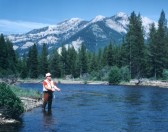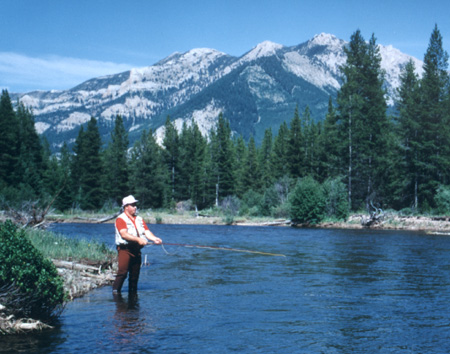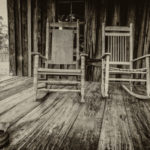 Kearneysville, WV. Sometime during the warm months of most every year, I watch the film A River Runs Through It. The mood often hits me when a cloud of melancholy descends and the business of life leaves me looking for escape to simpler times or the oppressive heat and humidity of the east leaves me longing for the hot dryness, the smell of pine, and the cool nights of Montana.
Kearneysville, WV. Sometime during the warm months of most every year, I watch the film A River Runs Through It. The mood often hits me when a cloud of melancholy descends and the business of life leaves me looking for escape to simpler times or the oppressive heat and humidity of the east leaves me longing for the hot dryness, the smell of pine, and the cool nights of Montana.
We moved from Montana when I was fourteen but only just over the border into Idaho. That move, though, took us from the south eastern part of the Big Sky State to north Idaho (the panhandle), which includes enough square miles to swallow up a good number of the diminutive north eastern states. And while some ignorant people might call all that space “fly-over country” and dismiss it as just more of the same, there were noticeable differences. I recall being shocked to learn that kids in Idaho told Montana jokes like Montanans tell jokes on the North Dakotans. As I recall, these jokes often included at least one sheep and a coyote (always pronounced “ki-ote” not ki-o-tee”).
It wasn’t just the jokes that were different. The weather in north Idaho is moist and cloudy. Fog hangs over the dark white pines until late in the mornings and the winters are often rainy and cold with the sun so shy that it sometimes doesn’t deign to make an appearance for days on end. This moistness makes the vegetation grow thick under the pines, spruce, and cedar with dripping ferns and alder hampering the progress of anyone who strays off the game trails that cover the mountains like thin gossamer threads.
Montana is different. The mountains in the west act as a barrier to the moisture coming from the coast, so the rain-filled clouds discharge their cargo upon Idaho as they struggle to muster enough altitude to rise above the mountains barring their way. As a result, Montana is drier. The sun shines in the winter revealing a cobalt sky with air so cold it hurts to breath and your nostrils freeze shut on a deep inhale only to release under the pressure of the exhale. The terrain gets drier and flatter as you head east and the mountains give way to broken hills (the flat topped ones are called “buttes”), the rivers slow and lose their sparkling clarity, and sage and prickly pear complement the juniper and knotty Ponderosa Pine. This is the country of the mule deer and prong-horned antelope, and it was here in eastern Montana that George Armstrong Custer, that brash leader of the ill-fated Seventh Cavalry, led his 278 men into a battle against several thousand well-armed and deeply offended Sioux and Northern Cheyennes. The Indians won that round but lost in the end, tragic casualties to prejudice, bad policies, deceit, and the clash of two incompatible civilizations. Today you can still find arrowheads lying on the dirt as if placed there only yesterday by the warrior who painstakingly fashioned it from the flint-like rock called “chert.”
However it is western Montana that calls me, and I suppose it is for this reason that when I’m feeling down—a feeling a lot like homesickness—I find myself watching a film set and filmed there.
Norman Maclean wrote the novella upon which the film is based after leaving Montana and making a career of teaching English at the University of Chicago. It’s a book about memories, about growing up, about the struggles to understand other people, struggles made all the more urgent and poignant because those involved are of the same family. It’s also a story about fishing, a mere activity for some, a barbarism for those who don’t know better, but a form of art for the Maclean family. Fishing is the catalyst for a story that trolls much deeper.
Maclean was in his seventies when he wrote this story about his youth. It is, perhaps, idealized. It is, perhaps, romanticized. It is, nevertheless, true. His years of reflection and perhaps even his physical distance from the place made it possible, perhaps even necessary, for him to write what he did.
Unlike Norman, his younger brother Paul is committed to remaining in his place. He emphatically declares that he’ll never leave Montana. Yet, he died an early and violent death after an enigmatic life where his talents as a fisherman were only matched by his passion for whiskey and his penchant for high-stakes poker. Paul stays home and dies. Norman leaves and lives to immortalize his place in the words he writes.
Disdain for outsiders is clearly voiced in the film and this disdain still exists in Montana and other rural places that have suffered the indignities of outsiders with money buying up choice property, demanding their own way, and expecting the locals to accede to the incessant demands in accents not native to that place. “Californian” is an epitaph broad enough to include any outsider who acts like he owns the place and can’t drive on snow-covered roads. “Damn Californians” is the rough equivalent of “damn Yankee” that is still sometimes uttered (and more often thought) in the south.
Being the son of two native Montanans, that general disdain for outsiders was instilled from a young age (this, of course, co-existed with a strongly cultivated habit of hospitality). Because I grew up before the California invasion (or what one old-timer described to me as the “Californication” of Montana), the objects of disdain were “easterners.” We were convinced that anyone who grew up east of the Mississippi were all naïve city folks, physically wanting, and lacking the good sense to survive even a night, much less a week, in the wilderness. Whenever his kids complained or suggested that things were too difficult or painful, my Dad (and Mom as well) bolstered us with a bit of advice rolled into regional pride: “you’ve got to be tough to live in the west.” Without thinking I’ve said that to my own sons, but they remind me that West Virginia is not the west, and while the Mountaineer State has its charms, they are right.
I suppose that non-fishermen find the fishing scenes in the film tedious and the pages of the book dedicated to that art even less comprehensible. But anyone who has plied clear mountain streams for native trout will not have this response. Maclean is an artist with the pen as his brother was an artist with a rod and line. My father taught me to fish those waters of Western Montana, but whereas the Macleans favored the Big Blackfoot our river of choice was (and is when possible) the South Fork of the Flathead.
Maclean, as I said, taught for his entire career in Chicago, but he owned a cabin on Swan Lake north of Missoula, and he spent his summers there, renewing the bond with his place and teaching his son to catch trout. I like to imagine that he favored a Royal Coachman dry fly on a number 10 hook, for that is the first fly I reach for when we’re in the Flathead.
Maclean’s father was a Presbyterian minister, whose austere theology informed his fishing, so much so that Maclean quips that in his home, there was no clear line between religion and fishing. Furthermore he and his brother were raised to believe that all the best fishermen were fly fisherman and the best fly fisherman were dry fly fisherman. My father’s Lutheran upbringing did not seem to instill the same rigidity. In fact, when it comes to fishing, he is as pragmatic as any Baptist. Like a fly fisherman, he uses a fly, but he also employs a float (we call it a “bobber”). And in an act that would appall any fly fishing purist, he skewers a grasshopper onto the hook thereby turning the neat threads and feathers of the fly into a tangle of colors and insect parts with spindly legs clawing the air on each side but after a few casts dangling behind. Thus, each day of fishing begins in a grassy field kicking the dew covered humps of vegetation that includes the ubiquitous “bear grass” as we search for the requisite number of “hoppers.” The hoppers favor the sun, so keep out of the shade. Dad still carries an old tin band-aid can into which we push the little tobacco spewing insects until the can sounds like a bag of popcorn happily popping away. It is only then that we head to the river carrying what Norman, no doubt, would disdainfully hold as the equivalent of a red Hills Bros. coffee can full of worms.
I still like to fish with my Dad, but now it happens only every couple of years. He’ll be seventy in a few months. I need to make a plan to travel across the continent to fish. To catch hoppers with my boys. To give them memories that they can keep forever and revisit when they are grown. They’ve done these things, but the repetition is important, just as the retelling of family stories solidifies their meaning in the circle of hearers who one day become the tellers.
Strange how all of these memories and more can be summoned by a story told in film by a man I never met. But stories, the best kind of stories, can do just that. They touch something common in us all. Thomas Wolfe said you can’t go home again, but I think he might have been mistaken. For home, at least the home of one’s youth, exists in memories carefully tended, memories handled regularly, dusted, and turned over in the mind, and thereby kept alive but also refined, refreshed, and distilled. In fact, memory may be the only place where the home of one’s youth still exists.






14 comments
Rob G
sorry — there should be no ‘r’ in ‘meticulous’ above!
Rob G
While looking up MacLean in the Cambridge Guide to Literature in English (he’s not in there), I stumbled across the Canadian author Alistair MacLeod, whom the guide describes as a “metriculous stylist” who often writes in “the perspective of a narrator who has ‘gone east’ in adult life and now looks back at the rural world of his childhood, contrasting its elemental vitality and harshness with the comfortable lifestyle of his present-day existence.”
Sounds promising — has anyone here read him?
Peter B. Nelson
Somewhere in one of his essays our Wendell Berry favorably contrasted “A River Runs Through It” to some lesser tale by Hemmingway. This piqued my curiosity and I ordered a copy.
Much to my surprise, it’s a page-turner of a novella. And, no, I’m not a fisherman.
When I finished, my wife read it. And she too lost sleep rushing through it. And, no, she doesn’t fish either.
Like you said, Maclean is an artist with words. God bless him for his gift to us.
Rob G
I wonder how much of this sentiment has to do with the feeling expressed by Wordsworth at the beginning of his ode — the fact that as we get older we tend to lose our sense of wonder, that we realize this is happening but nevertheless find it difficult to maintain. This feeling, I think has to do with both time and place. Thus when I drive through the neighborhood where I grew up, which I make it a point to do once a year or so, I am pulled back into a certain frame of mind that existed in a specific time by my presence in a specific place.
This is why Wordsworth is my favorite poet. Although it is difficult to put these ideas into rational terms, I have the conviction that W.W. “gets it.”
My heart leaps up when I behold
A rainbow in the sky:
So was it when my life began;
So is it now I am a man;
So be it when I shall grow old,
Or let me die!
The Child is the father of the Man;
And I could wish my days to be
Bound each to each in natural piety.
I’ve never seen ‘A River Runs Through It’ – I’ll have to remedy that.
A Stuvland
Mr. Mitchell, thanks for this piece. A River Runs Through It is also one of my favorite movies for similar reasons. I think you capture it well in your last paragraph, noting the film’s power to summon up important memories–memories to be well kept and tended to for future generations.
Matt Stewart
The disdain for outsiders you talk about reminds me of a smear ad I heard while living in Wyoming, complete with the attack ad voice and ominous music in the background: “[Candidate x] has only lived in Wyoming for 18 years.”
Marion Miner
It’s the open sky, the gravel roads, and the high school football field that does it for me; and in these respects, Virginia is not Nebraska.
Ha… and you’re right… it’s “ki-ote.”
Cecelia
Beautiful – made me want to go fishing – and I’m a fishing widow!
Jon Cook
Amen, brother! As one who grew up east (Ohio) and now lives in The West (New Mexico), and enjoys the wide open spaces, the arid beautiful land, the wilderness mountains, and yes trout on a fly, it’s not so much the home of my youth but the wonderful experience of my current life that you remind me of.
Katherine T
My recent move (from a sprawling country home filled with my many siblings and their even more numerous friends) to the Big City (how can a place with so many ppl feel so much like Odysseus’s encounter with his mother in Hades??) has left me wondering how to rightly cherish memories and distance places while also cherishing the present.
I wonder, is this longing for one’s childhood home really a longing for something we find only in the future? C.S. Lewis suggests in his sermon “Weight of Glory” that nostalgia is really a longing for heaven. This feeling of “missing out” or somehow being unable to enter into the fullness of what is really real — all this Lewis thinks is our soul’s memory of a forfeited Garden and our spirit’s hope for the Beautiful City.
If Lewis is right, then how do we rightly cherish the memories, places, and temporal items of today and yesterday? It would be deceitfully easy to dismiss these things as worthless in light of eternity. But it would also be a loss to long so deeply for the past that we fail to engage those present with us — or to live in light of the future.
Rob O.
I do truly love that movie. It makes me long for a past that I didn’t even have – I’ve never been to Montana and have fished scarcely a dozen times in my entire life. But the majesty of the settings, the purity of Norman’s father’s beliefs, the simplicity of the times… it worms its way right down into my core.
And the recounting of your own Montana is quite evocative too. Bravo!
I’m not sure I always agree with Robert Redford’s politics, but as a filmmaker, movies like “River…” and “The Natural” give me great cause to respect him.
Caleb Stegall
I thought this article was going to be about your latest pub crawl with Mr. Peters.
Robert
Mr. Mitchell,
If you get a chance you should float the Greenbrier River in south eastern West Virginia. While the river, and the scenery for that matter, doesn’t quite compare to that of your home state, I still think floating the Greenbrier is a pleasant way to spend a few days.
The Greenbrier is one of a handful of free flowing rivers in the east, and therefore most years you can only float it in the spring. You can find a list of potential trips on the WV DNR website. For some reason the site only list trips on the lower portion of the river. I’ve always enjoyed the northern sections because there is less development. I think perhaps the upper sections are not listed because there’s only enough water depth and volume to float them five or six weeks each spring.
Pandora Bracelet
This river is beautiful!
Comments are closed.